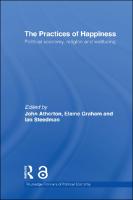The Practices of Happiness
Proposal review
Political Economy, Religion and Wellbeing
| dc.contributor.editor | Steedman, Ian | |
| dc.contributor.editor | Atherton, John R | |
| dc.contributor.editor | Graham, Elaine | |
| dc.date.accessioned | 2022-03-15T07:52:23Z | |
| dc.date.available | 2022-03-15T07:52:23Z | |
| dc.date.issued | 2011 | |
| dc.identifier | ONIX_20220314_9781136937552_19 | |
| dc.identifier | OCN: 695283667 | |
| dc.identifier.uri | https://library.oapen.org/handle/20.500.12657/53303 | |
| dc.description.abstract | A PDF version of this book is available for free in open access via www.tandfebooks.com as well as the OAPEN Library platform, www.oapen.org. It has been made available under a Creative Commons Attribution-Non Commercial-No Derivatives 3.0 license and is part of the OAPEN-UK research project. There is growing evidence that rising levels of prosperity in Western economies since 1945 have not been matched by greater incidences of reported well-being and happiness. Indeed, material affluence is often accompanied instead by greater social and individual distress. A growing literature within the humanities and social sciences is increasingly concerned to chart not only the underlying trends in recorded levels of happiness, but to consider what factors, if any, contribute to positive and sustainable experiences of well-being and quality of life. Increasingly, such research is focusing on the importance of values and beliefs in human satisfaction or quality of life; but the specific contribution of religion to these trends is relatively under-examined. This unique collection of essays seeks to rectify that omission, by identifying the nature and role of the religious contribution to wellbeing. A unique collection of nineteen leading scholars from the field of economics, psychology, public theology and social policy have been brought together in this volume to explore the religious contribution to the debate about happiness and well-being. These essays explore the religious dimensions to a number of key features of well-being, including marriage, crime and rehabilitation, work, inequality, mental health, environment, participation, institutional theory, business and trade. They engage particularly closely with current trends in economics in identifying alternative models of economic growth which focus on its qualitative as well as quantitative dimensions. This unique volume brings to public notice the nature and role of religion’s contribution to wellbeing, including new ways of measurement and evaluation. As such, it represents a valuable and unprecedented resource for the development of a broad-based religious contribution to the field. It will be of particular relevance for those who are concerned about the continuing debate about personal and societal well-being, as well as those who are interested in the continuing significance of religion for the future of public policy. | |
| dc.language | English | |
| dc.subject.classification | thema EDItEUR::K Economics, Finance, Business and Management::KJ Business and Management | en_US |
| dc.subject.classification | thema EDItEUR::K Economics, Finance, Business and Management::KC Economics | en_US |
| dc.subject.classification | thema EDItEUR::K Economics, Finance, Business and Management::KC Economics::KCA Economic theory and philosophy | en_US |
| dc.subject.classification | thema EDItEUR::Q Philosophy and Religion::QR Religion and beliefs::QRV Aspects of religion::QRVG Theology | en_US |
| dc.subject.other | atherton | |
| dc.subject.other | capital | |
| dc.subject.other | human | |
| dc.subject.other | hypothesis | |
| dc.subject.other | john | |
| dc.subject.other | religion | |
| dc.subject.other | religious | |
| dc.subject.other | social | |
| dc.subject.other | spiritual | |
| dc.subject.other | well-being | |
| dc.title | The Practices of Happiness | |
| dc.title.alternative | Political Economy, Religion and Wellbeing | |
| dc.type | book | |
| oapen.identifier.doi | 10.4324/9780203846902 | |
| oapen.relation.isPublishedBy | 7b3c7b10-5b1e-40b3-860e-c6dd5197f0bb | |
| oapen.relation.isbn | 9781136937552 | |
| oapen.relation.isbn | 9780415550970 | |
| oapen.relation.isbn | 9780415746830 | |
| oapen.relation.isbn | 9780203846902 | |
| oapen.imprint | Routledge | |
| oapen.pages | 240 | |
| peerreview.anonymity | Single-anonymised | |
| peerreview.id | bc80075c-96cc-4740-a9f3-a234bc2598f1 | |
| peerreview.open.review | No | |
| peerreview.publish.responsibility | Publisher | |
| peerreview.review.stage | Pre-publication | |
| peerreview.review.type | Proposal | |
| peerreview.reviewer.type | Internal editor | |
| peerreview.reviewer.type | External peer reviewer | |
| peerreview.title | Proposal review | |
| oapen.review.comments | Taylor & Francis open access titles are reviewed as a minimum at proposal stage by at least two external peer reviewers and an internal editor (additional reviews may be sought and additional content reviewed as required). |

